Daily Vocabulary Words: List of Daily Used Words in Leading Indian Newspapers
Hi there. Welcome to this special section @ Wordpandit. Our endeavour here is straightforward: highlighting daily vocabulary words that you would come across in leading newspapers in the country. We have included the following newspapers in our selection:
• The Times of India
• The Economic Times
• Hindustan Times
• Mint
• Indian Express
We are putting in extensive work to develop your vocabulary. All you have to do is be regular with this section and check out this post daily. This is your repository of commonly used words; essentially, we are posting a list of daily used words. Hence, this has significant practical application as it teaches you words that are commonly used in leading publications mentioned above.
Visit the website daily to learn words from leading Indian newspapers.
WORD-1: Murmured
CONTEXT: They stopped at the tent and murmured ‘Hello friends’.
SOURCE: Hindustan times
Explanatory Paragraph: Imagine you’re telling a secret to your teddy bear, but you speak so softly that only the teddy bear can hear it. That’s like murmuring. It’s when you talk very quietly so only someone close can hear, almost like a whisper.
Meaning: Spoken or made a sound quietly and softly (verb).
Pronunciation: MUR-murd
Synonyms: Whispered, mumbled, muttered, breathed, hummed, murmured.
Usage Examples:
1. She murmured a quick “thank you” as she received her gift.
2. He murmured the answer, barely loud enough to be heard.
3. The wind murmured through the trees, creating a peaceful sound.
4. They murmured their secrets in the dark, thinking no one else could hear.
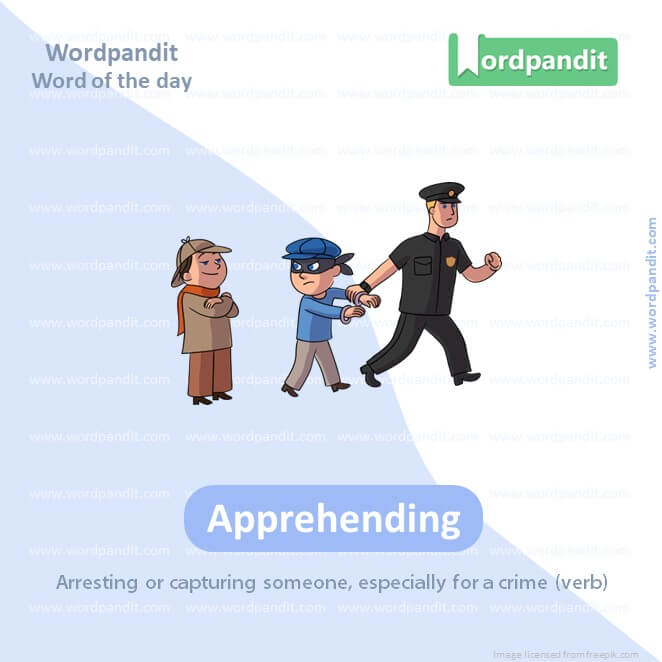
WORD-2: Apprehending
CONTEXT: The police on Tuesday arrested five more people in connection with the case, thus apprehending eight accused, an official said.
SOURCE: Hindustan times
Explanatory Paragraph: Imagine you’re playing hide and seek, and you’re “it.” You have to find and tag your friends. Apprehending is kind of like that – it’s when the police find and catch someone who did something wrong.
Meaning: Arresting or capturing someone, especially for a crime (verb).
Pronunciation: ap-ri-HEN-ding
Synonyms: Arresting, capturing, seizing, detaining, nabbing, catching.
Usage Examples:
1. The police are working on apprehending the thief.
2. After a long chase, the criminal was finally apprehended.
3. The fugitive was apprehended at the border.
4. Efforts are being made to apprehend the escaped prisoners.
WORD-3: Alleging
CONTEXT: A group of seven young men hailing from Punjab and Haryana have made an urgent plea to the authorities for assistance, alleging that they were deceived into military service in Russia and have been deployed to take part in Ukraine conflict, NDTV reported.
SOURCE: Hindustan times
Explanatory Paragraph: Imagine you’re telling your teacher that your dog ate your homework. You’re not showing proof; you’re just saying it happened. That’s like alleging. It’s when someone says something is true but hasn’t shown it yet.
Meaning: Claiming or asserting that something is the case without providing evidence (verb).
Pronunciation: uh-LEJ-ing
Synonyms: Claiming, asserting, accusing, charging, declaring, stating.
Usage Examples:
1. She is alleging that the company treated her unfairly.
2. The lawsuit involves allegations of misconduct by the CEO.
3. They are alleging fraud in the election process.
4. The article alleges corruption within the government.
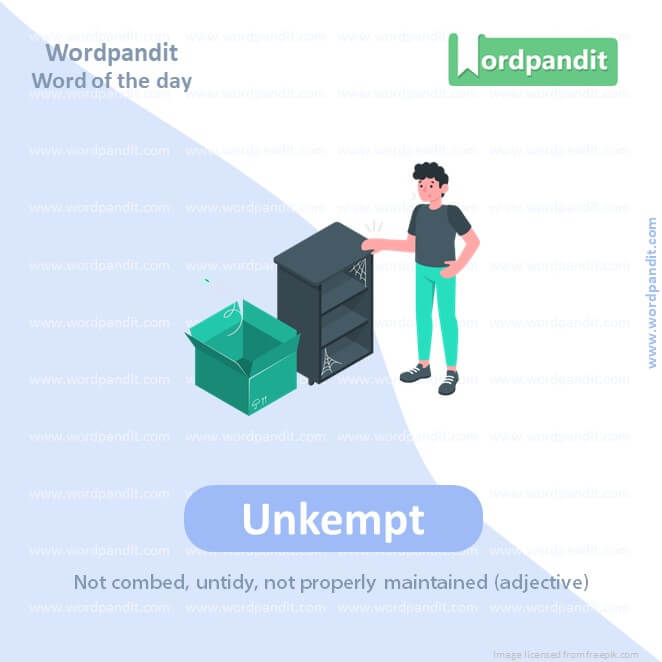
WORD-4: Unkempt
CONTEXT: They are positioned within a dimly lit and unkempt room with a sealed window at one end.
SOURCE: Hindustan times
Explanatory Paragraph: Imagine you played outside all day, and now your hair is all messy, and your clothes are dirty. That’s being unkempt. It means you look a bit messy because you haven’t tidied up yourself.
Meaning: Not combed, untidy, not properly maintained (adjective).
Pronunciation: un-KEMPT
Synonyms: Messy, disheveled, untidy, slovenly, scruffy, disordered.
Usage Examples:
1. He arrived at the meeting looking unkempt and tired.
2. The unkempt garden was full of weeds and overgrown bushes.
3. Her hair was unkempt after the windy walk.
4. The abandoned house looked unkempt and forgotten.
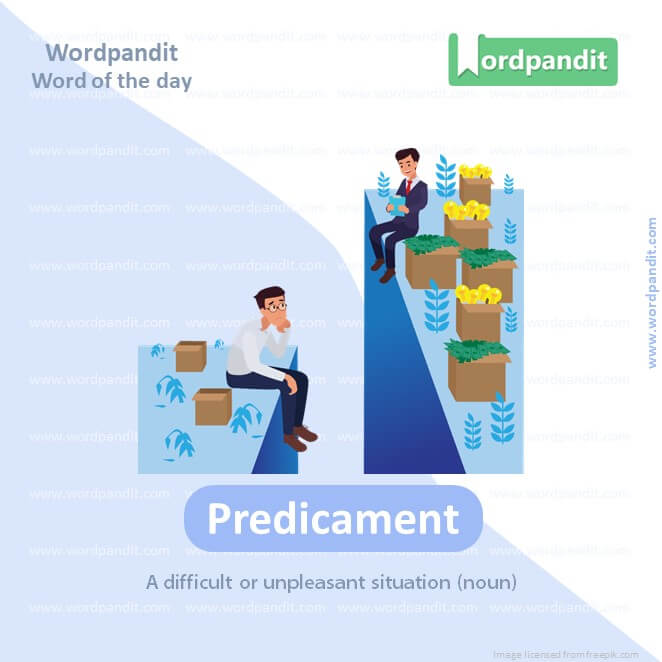
WORD-5: Predicament
CONTEXT: Six of them are clustered in a corner while the seventh, identified as 19-year-old Harsh from Karnal, Haryana, records a video message detailing their predicament and appealing for aid.
SOURCE: Hindustan times
Explanatory Paragraph: Imagine you climbed a tree and can’t get down, or you’re stuck between choosing ice cream or cake because both are your favorites. That’s a predicament. It means you’re in a tricky or difficult situation.
Meaning: A difficult, unpleasant, or embarrassing situation (noun).
Pronunciation: pri-DIK-uh-muhnt
Synonyms: Dilemma, quandary, problem, trouble, bind, jam.
Usage Examples:
1. She found herself in a predicament when she lost her keys.
2. Solving this issue puts us in a bit of a predicament.
3. His financial predicament worsened after the job loss.
4. The team faced a predicament with the project deadline approaching.
WORD-6: Impinges
CONTEXT: We then have to make a hypothesis that any power to tax impinges on mineral development.
SOURCE: Hindustan times
Explanatory Paragraph: Imagine playing with your toys in a certain space, and your sibling starts playing right next to you, taking up your space. That’s like impinging. It’s when someone or something starts to affect or limit your space or rights in an unwanted way.
Meaning: Affects or encroaches upon negatively (verb).
Pronunciation: im-PINJ-es
Synonyms: Encroach, infringe, intrude,trespass, interfere, impede.
Usage Examples:
1. The new regulations impinge on our freedom of speech.
2. His loud music impinges upon the peace of the neighborhood.
3. They argued that the law impinges on their constitutional rights.
4. The construction work impinged on the local wildlife habitat.
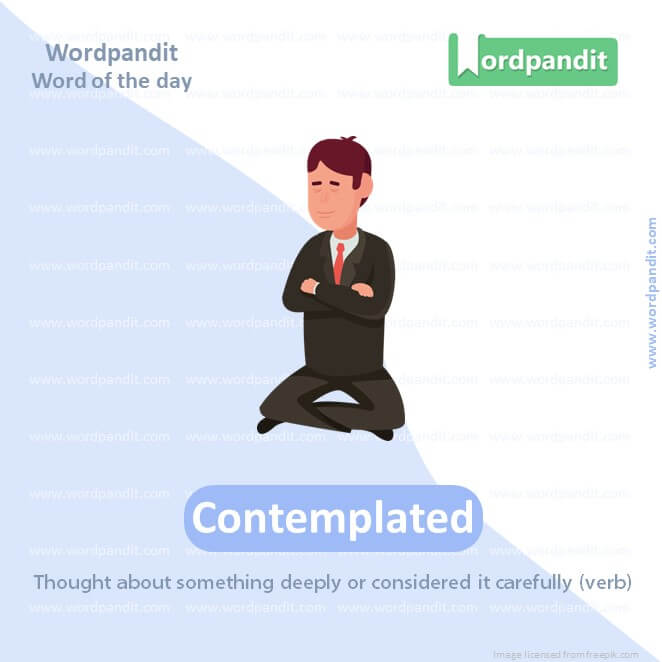
WORD-7: Contemplated
CONTEXT: Salve supported the Centre which had argued last week that states cannot be allowed to tax on minerals as this was never contemplated under the Constitution as it will unjustly enrich states rich in minerals pushing up prices of minerals, that form core of development of key industries in economy, and further lead to inflation.
SOURCE: Hindustan times
Explanatory Paragraph: Imagine you’re looking at the stars, thinking deeply about how far away they are. That’s like contemplating. It means to think very carefully about something, maybe a problem or a big question, for a long time.
Meaning: Thought about something deeply or considered carefully (verb).
Pronunciation: KON-tum-play-tid
Synonyms: Considered, pondered, deliberated, reflected, mused, meditated.
Usage Examples:
1. She contemplated the meaning of life while staring at the stars.
2. He contemplated quitting his job to travel the world.
3. The committee contemplated the best course of action.
4. They sat in silence, contemplating their next move.
WORD-8: Sanning
CONTEXT: Prime Minister Narendra Modi will remotely inaugurate the 17-km extension of the Delhi–Ghaziabad–Meerut Regional Rapid Transit System (RRTS) corridor, spanning from Duhai to Modi Nagar North on Wednesday.
SOURCE: Hindustan times
Explanatory Paragraph: Imagine you have a magic wand that you move over a book, and it helps you find words or pictures without having to read everything. That’s like scanning. It means looking over something quickly to find specific information without reading or looking at everything in detail.
Meaning: Examining something closely but quickly to find specific information or features; also, in technology, it refers to the action of capturing an image or text with a scanner (verb, noun).
Pronunciation: SKAN-ing
Synonyms: Searching, examining, reviewing, surveying, browsing, skimming.
Usage Examples:
1. He was scanning the crowd for his friends.
2. She scanned the document for any errors.
3. The cashier scanned the items at the checkout.
4. I’m scanning old photos to create digital copies.
WORD-9: Samlessly
CONTEXT: The inauguration of this additional 17-km section, Namo Bharat services will be seamlessly available on 34 km of the Delhi-Meerut RRTS corridor, incorporating eight stations from Sahibabad to Modinagar North,
SOURCE: Hindustan times
Explanatory Paragraph: Imagine you’re drawing a line with a crayon, and you can’t even tell where you started and stopped because it’s so smooth. That’s what “seamlessly” means. It’s when things join or happen very smoothly without any bumps or stops that you can notice, like a perfect drawing.
Meaning: Moving or transitioning smoothly without interruption or obvious joins (adverb).
Pronunciation: SEEM-lus-lee
Synonyms: Smoothly, flawlessly, effortlessly, continuously, perfectly, without a hitch.
Usage Examples:
1. The new software integrates seamlessly with the old system.
2. The movie transitions seamlessly between the past and present.
3. She moved seamlessly from one topic to another during her presentation.
4. Their team worked seamlessly to complete the project on time.
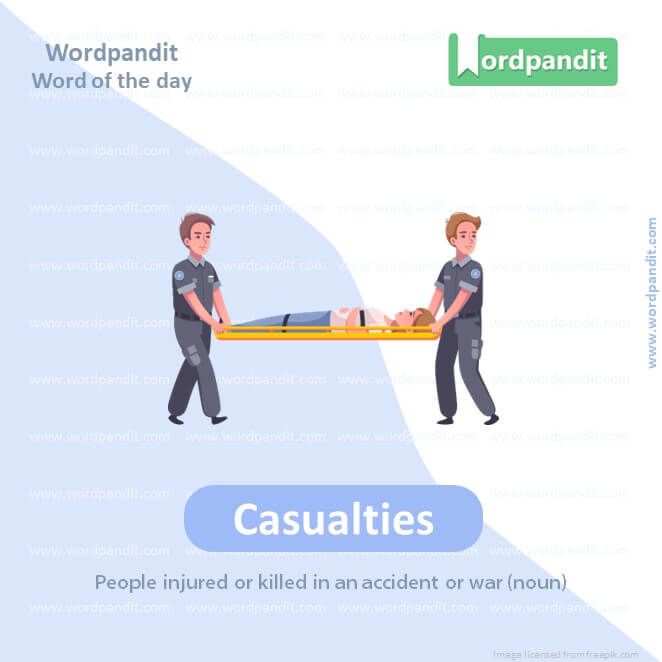
WORD-10: Casualties
CONTEXT the Russian military have approached authorities seeking help for their discharge, against the backdrop of reports of casualties among Indians forced to fight in the war against Ukraine.
SOURCE: Hindustan times
Explanatory Paragraph: Imagine if someone got hurt or something got broken when there was a big accident or during a game. That’s called a casualty. It’s when people are injured or killed in an accident or a fight.
Meaning: People injured or killed in an accident or war (noun).
Pronunciation: KAZH-oo-al-tees
Synonyms: Victims, fatalities, losses, wounded, injured, dead.
Usage Examples:
1. The car accident resulted in several casualties.
2. The battle had high casualties on both sides.
3. Emergency teams were quickly sent to help the casualties.
4. The report detailed the number of casualties from the natural disaster.
Vocabulary English Grammar
Delving into the vast universe of language learning, the ‘Vocabulary English Grammar’ acts as a beacon, illuminating the path to mastery. This synergy of words and rules forms the quintessential framework of the English language. However, understanding ‘Vocabulary English Grammar’ in-depth requires a fine-tuned strategy.
First and foremost, understanding ‘Vocabulary English Grammar’ goes beyond only remembering rules and words. It involves learning how a word functions in a grammatical context. To achieve this, resources like textbooks, online grammar guides, and interactive language learning apps prove to be very valuable.
However, embracing ‘Vocabulary English Grammar’ calls for consistent practice. Adopting thematic learning, where you concentrate on a specific grammatical concept and the vocabulary related to it, can be particularly effective. Reading material like articles and books, or engaging with podcasts and films can provide a real-world context to these concepts.
The key to mastering ‘Vocabulary English Grammar’ lies in constructing sentences. Instead of memorizing disconnected words and rules, start framing sentences. This active application significantly bolsters comprehension and provides practical insight into how grammatical rules govern the use of words.
To truly excel in ‘Vocabulary English Grammar’, it’s important to seek feedback. Participate in language exchange platforms or conversation clubs. These platforms provide an opportunity to apply what you’ve learned and obtain constructive feedback on your progress.
In essence, understanding ‘Vocabulary English Grammar’ is a step-by-step process that requires thoughtful learning, constant practice, application, and proactive feedback. By embedding these techniques into your language learning routine, you can confidently navigate ‘Vocabulary English Grammar’. Remember, mastering ‘Vocabulary English Grammar’ is not about perfection, but about progression and communication. Each rule learned, each word comprehended, brings you closer to the fluency in your English language journey.













